Home » Laptops
Total Pageviews
Popular Posts
-
With the Bajaj Avenger being the only bike to have firmly held its ground in the Indian cruiser segment over the years, Varad More now ...
-
After the launch of a Manza variant on Tuesday, Tata Motors on Wednesday launched the new Sports Utility Vehicle (SUV) Tata Safari Sto...
-
India Against Corruption (IAC) on Thursday rejected the allegations by former IPS officer YP Singh that its leader Arvind Kejriwal had...
-
John Cusack has appeared in more than 50 movies in the course of his nearly 30-year film career, including iconic roles in such classics ...
-
checkintonight.com Last-minute travel plans needn’t always leave a hole in your wallet. The latest ent...
-
In the latest development to highlight the sensitive terrain that the United States and China are navigating on economic issues, ...
-
Amazon has Kindle models for everyone: touch screen Kindles, keyboarded Kindles, LCD tablet Kindles and now the Kindle Paperwhite with ...
-
Pop star Katy Perry was spotted at the 35th birthday of ex-boyfriend John Mayer in the West Village's ABC Kitchen. They enjoyed ...
-
Off late, HTC has been quite aggressive in getting its One and Desire line-up in India. The latest smartphone to join ...
Followers
HP's 2013 outlook disappoints, as company continues turnaround effort
3:12 AM |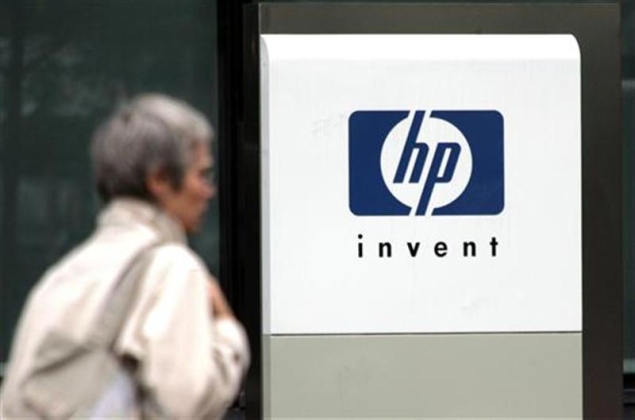
Hewlett-Packard Co's shares plunged to a nine-year low on Wednesday
after Chief Executive Meg Whitman warned of an unexpectedly steep
earnings slide in 2013, with revenue set to fall in every business
division except software.
Wall Street had hoped for quicker signs of
progress on Whitman's turnaround plan, which centers on transforming the
former industry powerhouse into an enterprise computing corporation
that can take on IBM and Dell Inc.
Whitman, who took the helm of
HP just over a year ago after a failed bid to become governor of
California, told investors that the company's recovery would start to
become visible only in fiscal 2014, when investments begin to pay off.
She blamed unprecedented executive turnover in past years for dragging out the Silicon Valley company's turnaround.
Analysts
say HP is struggling to shore up its credibility on Wall Street while
battling crumbling margins in an increasingly cut-throat PC arena,
tapering-off of IT spending, and an internal organizational overhaul
that involves thousands of layoffs.
"I was surprised that nothing
new was really said in terms of strategy, and the problem here is there
is lack of investor confidence in the current strategy," said Shaw Wu,
an analyst with Sterne Agee.
Shares of HP, the largest U.S.
technology company by sales, tumbled 13 percent on Wednesday in the
biggest single-day decline since August 2011.
Shares of some of HP's contract makers in Asia also fell when trading opened there on Thursday.
HP
gave a particularly gloomy outlook for enterprise services, its
business providing services to corporations and a key component of
Whitman's rescue plan.
Revenue from that division will dive 11 to
13 percent in fiscal 2013 and be barely profitable, with operating
margins of zero to 3 percent. That stands in stark contrast to IBM,
which raised its full-year earnings outlook, reflecting its ability to
manage costs, despite flat software revenue in the second quarter and a 2
percent decline in services.
Whitman became HP's third CEO in as
many years after taking over following Leo Apotheker's abrupt dismissal
just over one year ago. She is trying to revitalize the former industry
icon via layoffs, cost cutting, and expansion into areas with
longer-term potential such as enterprise computing services.
"The
single biggest challenge facing Hewlett-Packard has been changes in CEOs
and executive leadership, which has caused multiple inconsistent
strategic choices, and frankly some significant executional miscues,"
Whitman told the investor conference in San Francisco.
"This is important because as a result it is going to take longer to right this ship than any of us would like," she added.
HP
has lost more than two-thirds of its value since 2010, when its
capitalization topped out at about $104.5 billion. Squeezed by crumbling
demand for personal computers in a mobile era, significant leadership
turbulence, and the advent of Apple Inc's iPad that year, HP's stock
embarked on a steady decline. The company now has a market value around
$30 billion.
Since Whitman took the helm in September 2011, the stock has fallen about 35 percent.
Musical chairs
HP
has suffered through years of turbulence. Apotheker's 11-month tenure
was marked by an acceleration of departures from various divisions, such
as networking chief Marius Haas, as he brought in former coworkers from
SAP AG.
Apotheker's predecessor, Mark Hurd, who is now president
of Oracle Corp, also departed abruptly, after a sexual harassment
scandal.
HP, like rival Dell, is trying to transform itself into a
major enterprise computing provider in the mold of IBM, while slashing
expenses to boost the bottom line. Shares of Dell, the No. 2 U.S. PC
maker after HP, fell 4.7 percent on Wednesday, mired near nine-year
lows.
HP is laying off 29,000 employees over the next two years
and has written off $10.8 billion mostly related to the writedown of its
EDS services business. Meantime, its business continues to be hit by a
slowing in corporate spending and personal computer demand worldwide.
For
2013, the company forecast overall earnings, excluding restructuring
charges and other items, at between $3.40 to $3.60 a share in fiscal
2013. That's well below the average forecast by Wall Street analyst of
$4.18, according to Thomson Reuters I/B/E/S.
A large part of the
shortfall rests on the projected plunge in enterprise revenue, a
division that sells myriad services to businesses and has seen an
erosion in profitability.
Operating profit fell 22 percent in the July quarter, surpassed only by a 28 percent slump in personal computers.
Mike Nefkens, HP's acting global enterprise leader ,said fiscal 2013 "will be a fix and build year."
"We expect long-term growth to be back in the 3-5 percent range and long-term profit to be in the 7-9 percent range," he said.
The
heads of other business units also addressed Wednesday's conference,
touting both new products and challenges facing the groups.
HP is
battling formidable rivals on several fronts, particularly in cloud, or
remote computing, products and services, with Oracle and IBM
aggressively courting corporate customers.
China's Lenovo Group Ltd may overtake HP as the world's biggest PC seller this year.
"Asian
brands will continue to outperform western brands," said Angela Hsiang,
a Taiwan-based analyst at KGI Securities. "Western brands in general
are lagging their Asian peers in terms of grabbing market share in
fast-growing emerging markets."
Reflecting that brighter outlook,
Lenovo shares were not badly hit by HP's profit warning, falling less
than 1 percent. But Taiwan's Quanta Computer Inc and Compal Electronics
Inc, both contract makers for HP, suffered more, with their shares
dropping around 4 percent in Taipei.
Whitman vowed to reduce the
number of product offerings and to cut costs as HP tries to recover in a
worsening macro-economic environment. She has said it will take five
years for the turnaround to be effective.
"All of this is fixable but it is going to take some time," she said.
She
said HP eventually will have to compete in the smartphone market, but
stopped short of laying out a plan and said there were no plans to
introduce a smartphone in 2013.
Longer term, HP expects "to be a
GDP-like growth company with key pockets of higher growth," said Cathie
Lesjak, HP's chief financial officer.
Its stock closed down 13 percent at $14.91 on the New York Stock Exchange.
Mountain Lion review - a worthy upgrade
3:10 AM |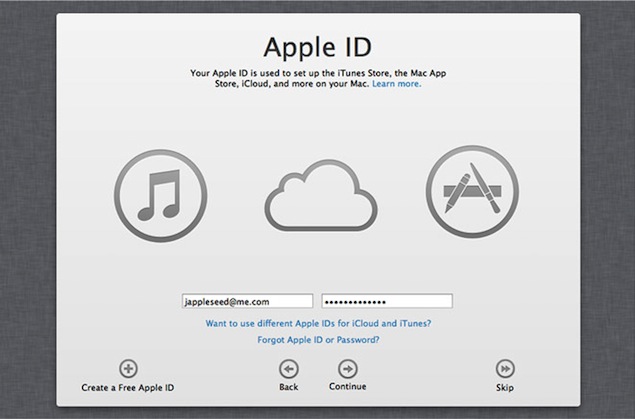
I
didn't need to spend a lot of time with the new Mac operating system to
see that phones and tablet computers have won out over personal
computers at Apple.
Mobile devices are already responsible for
the bulk of Apple's sales and profits. Now, Apple is making the new Mac
system even more like the iOS software that powers its iPhones and
iPads. It's also casually dropping the "Mac" name from the Mac OS X
operating software, though computers will still be called Macs, not
"Super-sized iPads."
The new system, formally OS X 10.8 and
dubbed Mountain Lion, went on sale Wednesday as a $19.99 download from
Apple's App Store. It builds on the previous system, Lion, which came
out last July.
Mountain Lion is made for a world where your
computer is just one of your computing devices, along with your iPhone
and your iPad. Apple wants to make it easier to switch from one to the
other, several times a day.
It's already easy to switch between
iPhone and iPad. For instance, songs and apps you buy on an iPad will
automatically pop up on your iPhone through Apple's iCloud
online-storage service. Lion has some iCloud features, but Mountain Lion
really brings the Mac into the iPhone-iPad family.
That's what I like most about Mountain Lion. It borrows a lot from its mobile cousin.
The
Mac already had such mobile-like features as the ability to zoom in or
out on a MacBook by pinching your fingers on its touchpad. Mountain Lion
goes a lot further:
- A notification center slides out from the right of the screen to offer calendar reminders and the latest mail items. It mimics, down to the background color, layout and font, the way you get Facebook updates, news alerts and other notices on your iPhone.
- The Mac's iChat app has been scrapped in favor of Messages, which is made phone friendly by incorporating the iMessage service for iPhone, iPad and iPod Touch users to exchange texts, photos and video. Now you can send messages from your Mountain Lion computer to your mobile friends, or reach another Mountain Lion user from your phone. The way conversations are presented feels more like texting than instant messaging.
- Mountain Lion borrows a "Share" button from iPhone and iPad apps. The iPhoto image organizer on Lion had that, but it's now built into other apps such as the Safari Web browser and the Preview document reader. The options change depending on the app. In Safari, for instance, you can send a Web page by email or post a link on Twitter. In Preview, you can share a photo on Flickr or add it to iPhoto.
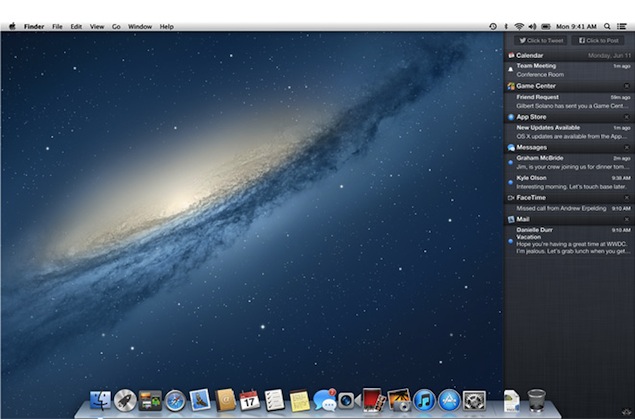
Facebook
integration is coming this fall. You'll be able to limit who sees your
post and add your current location through that share button. No longer
will you have to cut and paste links. Mountain Lion will also sync
contact information on Facebook friends with your Mac's address book.
You need to sign on to Facebook only once, and Mountain Lion takes care
of the rest.
That "single sign-on" feature is available right
away for other services, including Twitter and Flickr. Once you're
signed in, you don't need to enter your username and password again when
accessing that service from another app.
Mountain Lion brings over another philosophical change from the iPhone.
For
the longest time, personal computers let you install anything without
question. But with Apple's mobile devices, you are limited to
pre-approved software from the company's App Store. Apple wants to
protect you from bad experiences, but it has also rejected some
apparently harmless apps for mysterious reasons.
Mountain Lion
adopts that gatekeeper philosophy, though the restrictions aren't as
severe. If software you try to install doesn't come from the App Store,
it has to be from a software developer who has registered with Apple for
$99. The company doesn't review software unless it goes through the App
Store, but the Mac checks to make sure the registration is valid. A
registration can be yanked if a developer turns out to be evil.
I
was denied the ability to install Google's photo-editing software,
Picasa, likely because it was written before the registration program
began. It took some sleuthing to figure out how to override that.
Now
back to iCloud, my favorite part about Mountain Lion. All you need is
an Internet connection and an Apple ID - the same one you create for
free to buy songs and apps on iTunes. That Apple ID links your
experience across the various devices. The iCloud service comes with
five gigabytes of free storage; you can pay for more.
Consider
Pages, Numbers and Keynote - Apple's versions of Microsoft's popular
Office programs for word processing, spreadsheets and presentations.
Documents are automatically stored online through iCloud, unless you
change the location to a folder on your computer. It's a tactic
Microsoft plans with its just-announced Office upgrade.
That
means your documents follow you wherever you go. Type a sentence in a
document on your MacBook and see the changes on the iPad a half-minute
or so later. You can access your files even if you don't have an
Internet connection. Copies are stored on your computer, and changes
will be replicated to the iCloud folder once you're back online.
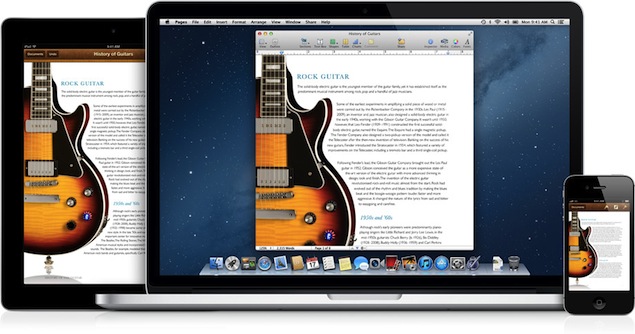
It's
not so graceful when you type on both devices at once, as you are
stopped and asked to choose one. But it's a promising start, and it's
not often you're working on both devices at once anyway.
You get
the benefits of iCloud when surfing the Web on Safari as well. You see
what websites are open on other devices, so if you started researching
that dream vacation at home, you can quickly access those same Web pages
in the office (Note to boss: I meant to say "financial balance sheet,"
not "dream vacation"). Think of it as automated bookmarks. For this to
fully work, your mobile devices need the iOS 6 upgrade this fall.
A number of other features jumped out:
- The search and address bars are now combined on Safari, just as they are on Google's Chrome browser. Too often, I had wasted my time entering search terms in the box for the Web address.
- Safari's Reading List now works offline. If you are reading a Web page and need to go somewhere, just click the small "glasses" icon for the browser to store a copy. You can continue reading in the car or on a train, even if you don't have an Internet connection.
- Gamers will appreciate Game Center, which started out as a way for mobile users to find opponents and keep track of high scores. Mountain Lion users can now join in the fun.
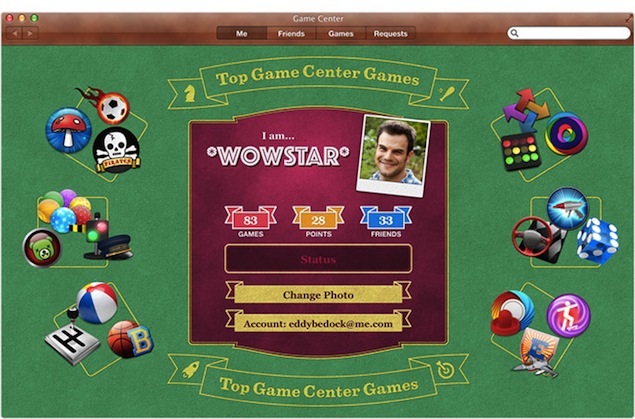
I
did run into a few hiccups using Mountain Lion, but none were
deal-breakers. The iCloud features were easy to use once I signed in,
but I had difficulty getting the startup screen to come up because of
how my office Wi-Fi network is set up. I also had some trouble getting a
new Notes program to sync, but it worked well once it did.
Apart from that, my experience was relatively pain-free and seamless.
If
you're a Windows user, see what Microsoft has in store with Windows 8,
which comes out Oct. 26. That system also promises to work well with
tablet computers, but will it be as seamless as Mountain Lion?
If
you already have a Mac, you can upgrade directly to Mountain Lion only
if it's running Lion or its 2009 predecessor, Snow Leopard. It took a
colleague an hour and a half to download and install Mountain Lion. You
can upgrade for free if you bought your Mac since June 11.
Otherwise,
shell out the $20. That's $20 for all your Macs, not each one. It's
well worth the price just for the integration with iCloud, and you get a
whole lot more.
Ultrabooks to contribute up to 20 percent of notebook PC sales: HP
3:06 AM |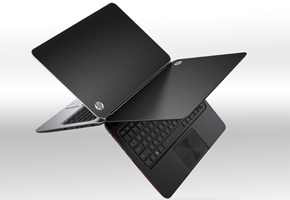
Computer maker HP expects 15-20 percent of its notebook PC sales to
come from the ultrabooks segment by the end of 2013 as a growing number
of mobile workers opt for lighter and faster devices.
Ultrabooks are
high-end notebooks designed to be lighter, have longer battery life and
shorter booting time. The ultrabooks are powered by processors from
Intel, which is the the driver of the concept.
"We expect that by
the end of 2013, 15-20 percent of our volumes will be that of Ultrabook
and by 2014-end, it should be around 40 per cent. We have a strong
lineup of products and across price points, which we think, would be a
crucial factor," HP India Vice President and General Manager (Printing
and Personal Systems Group) Rajiv Srivastava told PTI.
At present, ultrabooks comprise less than 10 percent of shipments for HP India, he added.
Computer
makers are betting big on the ultrabook segment as they present a
bigger margin opportunity. With devices starting from Rs. 40,000, the
prices go beyond Rs. 1 lakh depending on the configuration.
Almost
all major players like Dell, HCL Infosystems and Toshiba have their
products in the category and plan to add more products in the coming
months.
"Currently, the contribution of ultrabooks to the overall
notebook market is low. Its also a function of popularity and pricing.
As more people go for ultrabooks keeping in mind the functionality and
more affordable devices come out, the category will only grow,"
Srivastava said.
HP has about 8-9 devices in the category under
its 'Envy' range and plans more launches in the coming months. He,
however, declined to comment on the future product lineup.
"It is a
very competitive market and this will only grow. The differentiator
will be how technology is refreshed and what experience is provided to
the end-consumer," he said.
He added that the ultrabook will not
be a very price- sensitive category as the buyers are generally those
who have owned a PC earlier and are ready to pay a premium for a good
device.
HP has recently launched its Envy SpectreXT, priced Rs. 64,990 onwards.
PC
sales in the country grew 16 percent in 2011-12 at 10.8 million units
over the same period last year, according to hardware industry body
MAIT.
Of this notebooks and netbooks sales grew 26 percent to 3.7
million units and 0.28 million units (down 11 per cent), respectively,
driven by consumer segment. The remaining 6.7 million units was in the
desktop category, which grew 11 percent in 2011-12.
For FY'13, MAIT estimates the PC sales to grow 15 percent to reach 12.4 million units.
Labels
Acne
Alvin-Tan
Amy-Jackson
Anjali-Damania
Apps
AR-Rahman
Australia
Bagh-e-Jinnah-Park-Lahore
Bagh-Ibn-e-Qasim
Barcelona
Bike
BJP
Budget
Cameras
Cave-Temple-Indonesia
Chitrangada-Singh
CSK
Dark-Skin
Dead-Acacia-Trees
Deals
Dia-Mirza
Economy
Entertainments
Evelyn-Sharma
Exclusive
Food-Drink
Gaming
Gauhar-Khan
Gold-Price
Haripriya
Health
Home-Entertainments
Hotels
Hrithik-Roshan
Internet
Jobs
Kajal-Agarwal
Kangana-Ranaut
Kareena-Kapoor
Katrina-Kaif
Katy-Perry
Kingfisher
Laptops
Life-Style
London
Madhurima
Malala-Yousafzai
Malvika-Raaj
Manmohan-Singh
Maruti-Alto
Mathew-Hayden
Mobiles
Mouli-Ganguly
Moustafa-Ismail
Narenra-Modi
Obama
Oresund-Bridge
Pataudi-Palace
Piedra-Del-Penol
Priyanka-Chopra
Rahul-Gandhi
Rape
Real-Estate
Recipes
Roshni-Chopra
Sachin
Sachin-Tendulkar
Safari-Storme
Saif-Ali-Khan
Samantha
Sapporo-Snow-Festival-Japan
Sarah-Jane-Dias
Sensex
Shazahn-Padamsee
Shruti-Hassan
Social-Networking
Socotra-Island
Sony-VAIO
Sports
Steelers
Student of the Year
Sulagna-Panigrahi
Surveen-Chawla
Tablets
Taobat-Neelum-Valley
Technology
Telecom
Tragedy
Travel
Undersea-Tube-Tunnel
Vivian-Lee
Whitehaven-Beach
Whitsunday-Island
Yami-Gautam
Yash-Chopra
Yuvraj-Singh
Zarine-Khan








